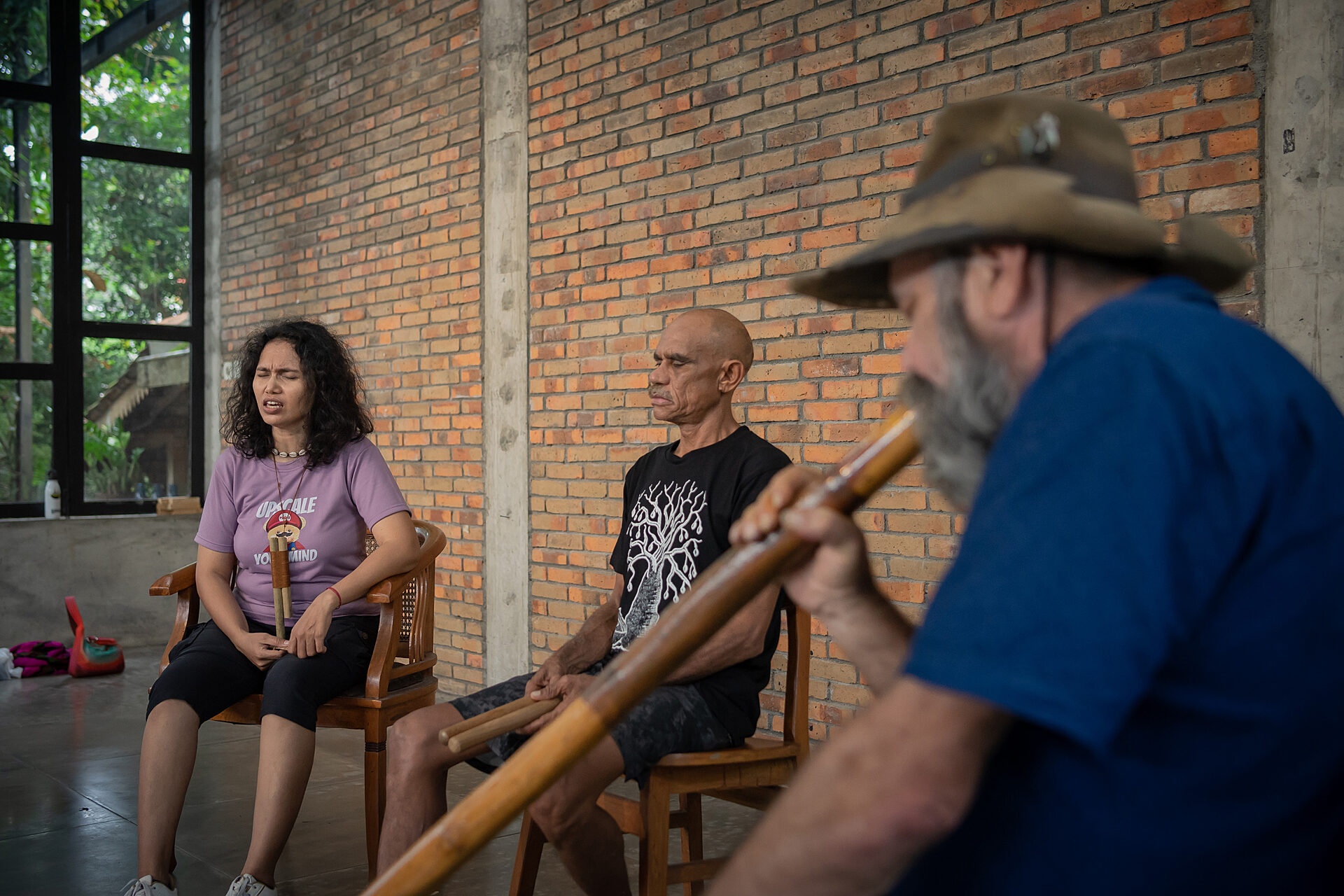Tura is progressing a significant new chapter in intercultural collaboration through Kai Jawa, the first major activation of Sound Connections – a multi-year initiative exploring how music and storytelling build bridges across cultures throughout the Indo-Pacific.
Rooted in ancient relationships between northern Australia and the Indonesian archipelago, Sound Connections asks how pre-colonial exchanges might inform contemporary creative futures. For generations before European arrival, Makassan and other seafarers travelled to the Kimberley and Arnhem Land to harvest trepang, forging enduring ties with First Nations communities through language, ceremony, trade and shared cultural practice. These deep-time connections inspire Kai Jawa, named after the term used by Indonesian traders to describe the Kimberley region.
About Kai Jawa
From 7–13 December 2025, Tura is bringing together an extraordinary group of artists and cultural leaders for a week-long creative residency in Yogyakarta, working collectively to develop new music grounded in cultural exchange, reciprocity and First Nations leadership. Participating artists include:
- Chris Griffiths – Miriwoong, Ngaliwurru and Karangpurru songman and composer (Australia)
- Nyak Ina Raseuki (Ubiet) – composer, vocalist and ethnomusicologist (Indonesia)
- Septina Layan – Papuan composer, singer and cultural researcher (Indonesia)
- Mark Atkins – Yamatji didgeridoo artist, composer and storyteller (Australia)
Across a week of collaborative workshops at SaRang Art Centre, the artists will share musical knowledge, cultural practices and approaches to storytelling. The residency will culminate in work-in-progress showings for Indonesian audiences, offering insight into the early stages of this new intercultural repertoire.
Facilitating the project in Yogyakarta is curator, executive producer and cultural diplomacy specialist, Kate Ben Tovim.
A First Nations-led conversation across the region
For Chris Griffiths, Kai Jawa represents both continuity and renewal. As a senior songman, he sees the project as a reconnection with the historic ties that once flourished across northern waters:
“For our people, Wanga is living history – it carries law, country and the voices of our ancestors. Kai Jawa is a continuation of the connections our old people once held with the north. I take these songs with responsibility, to share them in the right way and to build relationships that honour the past while imagining new possibilities.”
Kai Jawa also offers an important platform for Papuan artist Septina Layan, whose work champions the visibility and vitality of Papuan music traditions within Indonesia, and for Ubiet, a leading figure in Indonesian contemporary music and the preservation of traditional song forms across the archipelago. The project also continues Mark Atkins’ earlier collaboration with Ubiet in 2019. Together, the artists bring First Nations and Indigenous lineages – Miriwoong, Papuan, Yamatji, Ngaliwurru and Karangpurru – into dialogue with musical practices from across Indonesia.
Tura’s Sound Connections Strategy
Sound Connections is Tura’s framework for intercultural work across the South-East Asia and Pacific regions. Built on Tura’s long-standing engagement in the Kimberley and earlier collaborations in Indonesia, the strategy emphasises:
- Artist-to-artist exchange
- Knowledge sharing and archival outcomes
- Long-term relationships
- First Nations leadership
- Reciprocity between communities
Kai Jawa is the first activation of the expanded Sound Connections program and will form the foundation of an intercultural repertoire intended for future touring in Australia, Indonesia and the broader Indo-Pacific.
This work builds on earlier foundations established in 2018–2019 through the Kimberley Indonesia Project, which laid the groundwork for a larger, multi-year strategy for developing creative partnerships across the region.
Over the next five years, this program will grow to include performances, symposia, documentary outputs, academic partnerships and further residencies, building new cultural networks and reconnecting ancient ones.
Looking Ahead
Kai Jawa is more than the creation of new music – it is a catalyst for collaboration among historians, artists, academics and cultural knowledge holders engaged in revisiting and reimagining the shared histories of the Indo-Pacific.
The creative material developed in Yogyakarta will shape larger-scale works intended for presentation in Australia and Indonesia from 2026–2029, including festival presentations, international touring and the development of regional partnerships.
This collaboration is supported through Music Australia’s International Development funding, enabling Chris Griffiths to undertake this exchange and continue building international artistic relationships as part of Tura’s Sound Connections program.
As this work develops, Tura will share updates, documentation and reflections from the artists as part of the Sound Connections journey.
A Kai Jawa work-in-progress showing and artists’ talk will take place on Friday 12 December at 7.30pm at SaRang Art Centre, Jl. Ambarbinangun, Kalipakis 05/02, Tirtonirmolo, Kasihan Bantul.
This project has been made possible with the support of the Australian Government through Music Australia and Creative Australia, its principal arts investment and advisory body, and the Western Australian State Government.

